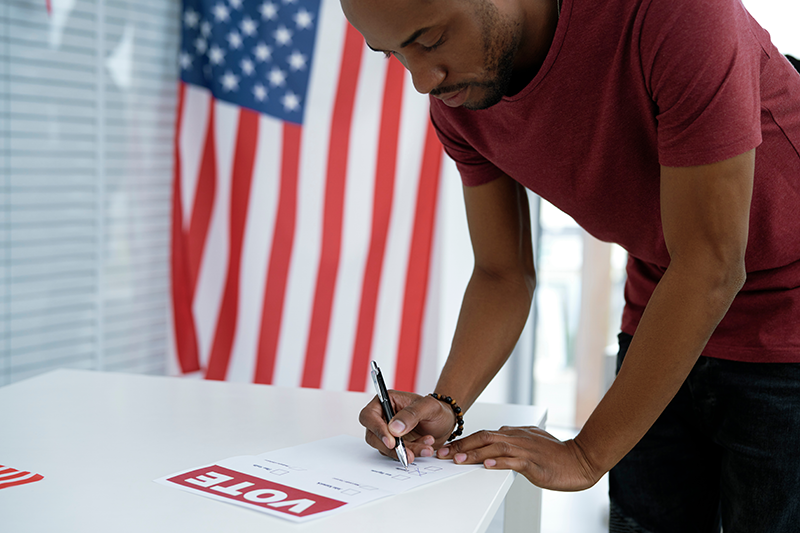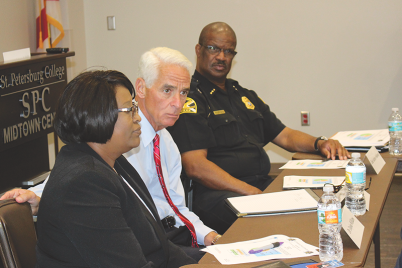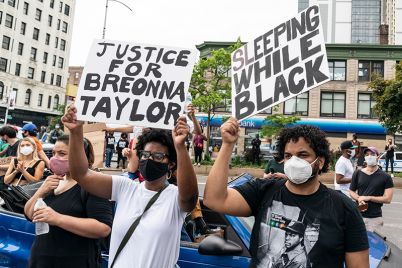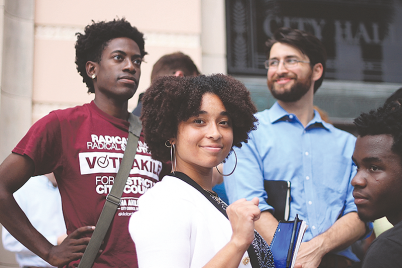Florida Rising hosted a discussion on Black men and voting rights in virtual conversation featuring Tampa Bay Breakfast Club members Brother John Muhammad, Jabaar Edmond, Reno Moore and others throughout the state.
BY FRANK DROUZAS, Staff Writer
STATEWIDE — Florida Rising discussed African-American men’s voting rights in the virtual conversation, “My Vote, My Choice,” which explored the connection between the day-to-day struggles of Black Men and voting.
Florida Rising is a statewide voting rights and grassroots organizing group in Florida working to build power in Black and Brown communities. They organize multi-racial movements to win elections and change laws to create a state where everyone can be safe, happy, healthy, and whole.
Moderated by Miwai Osahar, Florida Rising electoral field manager, the discussion featured members of Florida Rising and Florida residents throughout the state.
Concerning whether the Black vote matters these days, activist Reno Moore believes that the Black vote carries little weight without an agenda.
“I’ll say our vote don’t matter because we’ve lacked an ability in the past of creating an agenda,” he said. “Because we haven’t created an agenda for ourselves, then our vote is powerless in essence.”
“I think civil disobedience and non-compliance will work better than voting,” said Eric, a community activist, adding that despite Black people helping get Joe Biden elected, the president has not done enough to help them.
“I feel my vote matter because it plays a role for the majority,” said Will. “The people we have that are willing to vote, that are willing to get their voice heard, that are willing to speak up for the policies, and the people that they want to represent them, then that’s what starts a chain reaction for things to happen in our community, for things to get better in our community.”
Mutaqee Akbar, attorney and president of the Tallahassee branch of the NAACP, said he believes Black men’s votes and participation do indeed matter.
“But I think active participation, aggressive participation, and a high intellectual, political capacity at the same time matters,” he said. “We can come up with an agenda; we can come up with what we want and can also again hold our elected officials accountable for all these promises that they make during this time of the year … if we’re not active in the process, then we will be dismissed.”
Dwight Bullard, senior public advisor for Florida Rising, raised another question: “If we’re not satisfied with the people in office who look like us, what is it that we as Black people need to do to connect the gap between representation in government and in individual communities?”
Eric expressed dissatisfaction with the current Congressional Black Caucus, as he believes it has not used its power to help African Americans and felt its members should be voted out. Participant Anthony Malcolm concurred that Black people were not selecting the right people to represent them.
“We’re going to have to get people up there that’s going to stand up and fight for our rights unapologetically,” he said. “If we’re not, we’re just sending people up there to fight intersectionality issues, and nothing is going to go anywhere.”
Greg Doss, who served in the military and noted that he had spent time in countries with severe oppression, believes participation in the voting process is crucial.
“We should focus our attention on how do we move forward,” he said, “not the issue with the ones that are already there because if you don’t want them there, vote.”
“A way for us to move forward is getting more African Americans involved in politics,” Eric offered.
Regarding what it is that can unify Black men in politics, Brother John Muhammad, Pinellas County organizer for Florida Rising, said: “I think one of the things that we can all agree on is the need for us to have an agenda that we develop that speaks to our needs and our interest.”
Akbar noted that Black people must vote for those “who have our community in mind, find people who have justice in mind, find people who understand the plight of young Black brothers, young Black sisters, that’s growing up in a certain environment.”
Jabaar Edmond, community organizer and activist, asserted that Black men must become more active in “every level of politics,” either as vote casters or office seekers.
“What we have to do is become active participants in the political process,” Edmond stated. “Either we’re not voting or we’re not the ones being voted for.”
Doss pointed out that there are many paths available to let your voice be heard, including getting in touch with elected representatives.
“The onus of your progress is always on the individual,” he said. “You have the right, even if you don’t vote, to [go to] your elected official and air your grievances. That’s part of the First Amendment.”
Edmond said the Black community must get out of blame game mode and take responsibility for our people.
“What that means is running for office; what that means is supporting candidates that run for office,” he asserted.
Donating and volunteering are also vital, he stressed, specifically for local elections, as local politicians often have the most direct impact on people’s lives.
“We can’t fix our condition if we’re not willing to fix it ourselves,” he stated.
Muhammad noted: “We also need policymakers who have a heart and a mind to do the will of the people who elect them and are hurting, suffering, and having a voice that oftentimes goes unheard.”
Akbar underscored the importance of in-person meetings and forums to organize and build agendas together, along with “candidate training” and even training for community members who wish to be help with fundraising and organizing.
Learn more about Florida Rising at floridarising.org.








